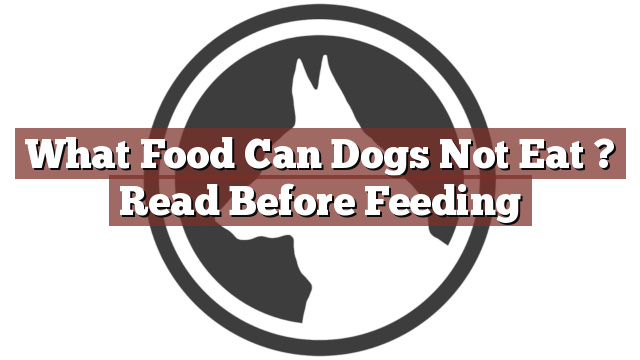Understanding Your Dog’s Dietary Needs
As a responsible pet owner, it is essential to understand your dog’s dietary needs. Dogs have unique dietary requirements that differ from humans, and it is crucial to provide them with a balanced and nutritious diet. While dogs are omnivores, meaning they can consume both meat and plant-based foods, there are certain foods that can be harmful or even toxic to them. It is essential to be aware of these foods to keep your furry friend safe and healthy.
What Food Can Dogs Not Eat? Read Before Feeding
When it comes to what food can dogs not eat, there are several items that should be strictly avoided. Some of these foods can cause mild digestive issues, while others can lead to severe health complications or even be fatal for your dog. It is important to note that the list of harmful foods for dogs may vary based on breed, size, and individual sensitivities. However, there are some common foods that should never be fed to dogs:
- Chocolate: Dogs should never consume chocolate as it contains theobromine, which is toxic to them. Even small amounts can cause vomiting, diarrhea, irregular heartbeat, and potentially lead to seizures or death.
- Grapes and raisins: These fruits, although healthy for humans, can cause kidney failure in dogs. It is best to avoid feeding grapes or raisins in any form to your furry companion.
- Onions and garlic: These ingredients, often found in many human dishes, can cause anemia in dogs. Whether it is raw, cooked, or powdered, it is best to keep onions and garlic away from your four-legged friend.
- Avocado: While avocados contain healthy fats for humans, they can be harmful to dogs. The presence of persin in avocados can cause vomiting, diarrhea, and even heart congestion in dogs.
It is important to note that this is not an exhaustive list, and there are other foods that can be harmful to dogs. If you are unsure whether a particular food is safe for your dog to eat, it is always best to consult your veterinarian.
Pros and Cons of Feeding Forbidden Food to Dogs
As a dog owner, you may be tempted to share your meals or treats with your furry companion. However, it is crucial to weigh the pros and cons before feeding forbidden food to dogs. While certain human foods may seem harmless, they can have adverse effects on your dog’s health.
The pros of feeding forbidden food to dogs may include the joy it brings to your pet and the feeling of inclusion. However, these pros are outweighed by the cons. Feeding your dog forbidden food can lead to various health issues such as gastrointestinal upset, pancreatitis, food poisoning, or even organ damage. Additionally, certain foods can cause allergies or trigger sensitivities in dogs, leading to chronic health problems.
Conclusion: Keeping Your Dog Safe and Healthy
In conclusion, it is vital to prioritize your dog’s health and safety by being aware of what food they cannot eat. While certain human foods may be safe for dogs, there are several items that can be harmful or toxic. Remember to avoid foods like chocolate, grapes, onions, garlic, and avocado, among others. By providing your dog with a balanced and nutritious diet specifically tailored to their needs, you can ensure their overall well-being. If you have any doubts or concerns about what food is safe for your dog, it is always best to consult with your veterinarian.
Thank you for taking the time to read through our exploration of [page_title]. As every dog lover knows, our furry friends have unique dietary needs and responses, often varying from one canine to another. This is why it's paramount to approach any changes in their diet with caution and knowledge.
Before introducing any new treats or making alterations to your dog's diet based on our insights, it's crucial to consult with a veterinarian about [page_title]. Their expertise ensures that the choices you make are well-suited to your particular pet's health and well-being.
Even seemingly harmless foods can sometimes lead to allergic reactions or digestive issues, which is why monitoring your dog after introducing any new food item is essential.
The content provided here on [page_title] is crafted with care, thorough research, and a genuine love for dogs. Nevertheless, it serves as a general guideline and should not be considered a substitute for professional veterinary advice.
Always prioritize the expert insights of your veterinarian, and remember that the health and happiness of your furry companion come first.
May your journey with your pet continue to be filled with joy, love, and safe culinary adventures. Happy reading, and even happier snacking for your canine friend!

